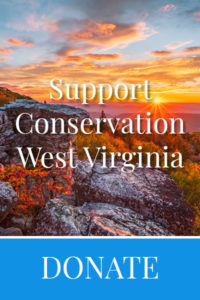2022 Legislative Recap: One Step Forward and Two Steps Back
The West Virginia Legislature ended its 2022 regular session at midnight March 12, 2022. Altogether, the Legislature passed 293 bills. Sixty-two bills introduced were energy or environment related. Only 8 of them passed. Some of the unsuccessful bills we opposed. Many more we supported.
Energy Policy
There was a lot of long-range thinking about the energy mix in the State. Several successful bills sought to prepare the way for new sources of energy, which CWV generally supported. Here are the energy policy bills that were passed:
- Repeal of Restrictions on Nuclear Power (SB 4). This bill simply wiped away cautious public policy regarding nuclear power plants for no clear immediate benefits to the state. CWV opposed the bill, while generally supporting nuclear power as an alternative to fossil fuels.
- Geothermal Energy (HB 4098). This bill created a legal and administrative structure for the development of geothermal energy in the state. It was introduced at the behest of WVU. CWV supported the bill.
Here are the energy policy bills that did not pass:
- Local Energy Efficiency Partnerships (HB 2225 and 2812). This bill would have authorized units of local government to create energy efficiency partnerships and districts, and to fund them by property tax assessments. CWV supported the bill. It died in committee.
- Limiting Wind Power (HB 3062). This bill would have limited the number of permits to construct wind power projects, wind power farms, or “windmills” for power to two per year, and ensured that coal remains the chief source of energy in West Virginia. CWV opposed the bill. It died in committee.
- Preservation of Coal Supplies and Coal-Fired Plants (HB 2713). Among other things, this bill would have required 2019 levels of coal consumption at coal-fired plants to be maintained, and each such plant to have a 90-day supply of coal. It also would have imposed onerous requirements before a plant could be shut down. CWV opposed the bill. It died in committee.
Climate
Not much progress was made in this important area. Here is the bill that passed:
- Carbon Sequestration (HB 4491). This bill establishes a new legal and regulatory framework for drilling of injection wells and operation of facilities for the underground sequestration of injected carbon dioxide. CWV did not take a position.
Important bills affecting climate and environmental quality failed to pass:
- Orphan Well Prevention (HB 4054 and SB 56). These bills used various mechanisms to shift greater financial responsibility onto operators for plugging current wells and preventing future orphan wells. CWV supported both bills. Both died in committee.
- Wildlife Impact Fee (SB 117). Authorizing DNR to assess a wildlife replacement fee on operators of wind power projects that kill protected avian species, such as eagles, owls, etc. CWV supported the bill. It died in committee.
Water Quality
There was a lot of action in this area. One important bill passed:
- Water Quality Standards (SB 279). This bill tightened water quality standards on some criteria and relaxed them on others, including suspected carcinogens and pesticides. It also shifted authority to approve future changes to standards to the DEP, bypassing the legislature. CWV opposed the bill.
Other water quality bills failed to pass:
- Aboveground Storage Tank Act Amendments (HB 2598). In its amended form, this bill would have exempted smaller storage tanks located just above drinking water intakes from DEP inspection and required self-inspection by tank owners. CWV opposed the bill. The bill passed the House but died in Senate committee.
- Clean Drinking Water Act of 2022 (HB 4055). The bill would have required DHHR to propose maximum contaminant levels or treatment techniques for certain PFAS pollutants and required reports from facilities using certain PFAS chemicals. CWV supported the bill. It died in committee.
- Assessing Health Impact of Water Rules (HB 2228). Requiring the Commissioner of Bureau for Public Health to conduct a public health impact assessment of any new air or water rule, or modification of an existing air or water rule, proposed by the Department of Environmental Protection. CWV supported the bill. It died in committee.
Public and Private Land Use
Two hotly contested bills came before the Legislature dealing with land use. One passed in amended form. The other died.
- Development Contracts for State Parks (HB 4408). In its amended form, this bill will enlarge the authority of the Director of DNR to enter third-party contracts for the development of recreation facilities at any state park or forest to a total of 40 years. A public hearing must be conducted before a contract is issued. No specific type of facility is prohibited. CWV opposed the bill.
- Permissive Zoning for Non-Utility Power Facilities (HB 4553). This bill would have amended the statutory structure of zoning regulation in the state as it relates to non-utility wholesale electric power generators, such as wind and solar installations. It declared that these power generation facilities are “permitted uses” in any zoning district. CWV opposed the bill. It passed the House but died in Senate committee.
Waste Management
In this area, one bill backed by industry passed, while two backed by environmentalists failed.
- Recycling of Post-Use Polymers (HB 4084). This bill will permit the construction and operation of plants to convert post-use plastics sorted from other solid waste into smaller particles through heating and other processes. Intended products are simpler plastics, waxes, lubricants, and coatings. CWV took no position. The bill passed.
- Beverage Container Recycling and Litter Control (HB 2105). This bill would have required the use of returnable containers for soft-drinks, soda water, carbonated natural or mineral water, other nonalcoholic carbonated drinks and for beer. It also would have required the use of unredeemed bottle deposits. CWV supported the bill. It died in committee.
- Safe Composting (HB 4452). This bill would have amended the Solid Waste Management Act to add procedures for separating organic food wastes from non-organic wastes and to compost that waste safely. The DEP would have been charged with creating legislative rules governing the process. The bill would also have required the curbside pickup of organic wastes. CWV supported the bill. It died in committee.
In the near future Conservation West Virginia will post the voting behavior of individual legislators. It is time to praise some, and hold others accountable.

